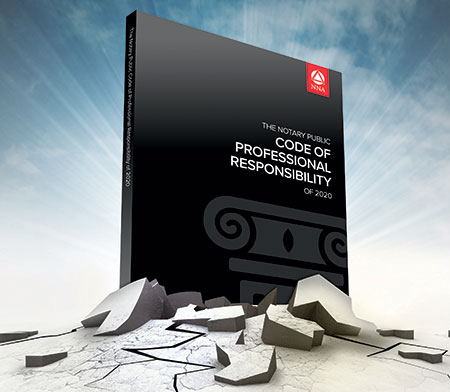
Almost 20 years ago, the Privacy Rights Clearinghouse began identifying current privacy concerns facing our world. Currently, there are 26 privacy issues listed. Some of the topics on that list include biometrics technologies, video surveillance, online privacy and e-commerce, workplace monitoring, wireless communications and location tracking, data profiling, criminal identity theft, medical records confidentiality, smart grid, data anonymization, big data, and the Internet.
Even before the Privacy Rights Clearinghouse started to compile its list, the National Notary Association had identified privacy as one of ten core Guiding Principles for regulating a Notary’s conduct in its 1998 Notary Public Code of Professional Responsibility.
The 2020 Code builds on that foundation. Guiding Principle VIII of the 2020 Code reads: “The Notary shall protect the privacy of each principal and not examine, copy, divulge, or use personal or proprietary information disclosed during the execution of a notarial act unless required by law.” There have been a couple of important changes to the wording in this Guiding Principle. The 1998 Code called Notaries to “respect the privacy” of principals requesting notarizations. The 2020 Code strengthens that by now mandating the Notary “protect the privacy” of principals. Whereas the 1998 Code only required a Notary not to “divulge or use” a principal’s “personal or proprietary” information, the 2020 Code now dictates that the Notary not “examine” or “copy” such information as well.
The touchpoints between Notaries Public and privacy are many:
- A Notary verifies the identity of signers by reviewing personal information on government-issued identification
- A Notary is privy to sensitive financial information in documents
- A Notary records information from IDs in journal entries
- A Notary stores journals
- A Notary provides public access to journal entries
- In California, a Notary obtains thumbprints of document signers in journal entries.
Guiding Principle VIII of the Code provides thoughtful rules on these touchpoints. It addresses how far a Notary should go in reviewing or examining the text of a document prior to notarization. It prohibits Notaries from copying notarized documents or information in notarized documents and recording full identification serial or Social Security numbers, date of birth, or other non-public personal information in the journal unless allowed or required by law. It forbids Notaries from divulging information about the circumstances of a document requiring a notarial act and selling or using information extracted from the text of a document requiring a notarial act or from other documents possessed by the principal for personal gain. It also lays out rules for providing access or copies of journal entries to members of the public.
More Notaries are dealing with privacy issues than ever before. Notary Signing Agents, for example, routinely view mortgage loan applications containing Social Security and bank account numbers and receive and ship checks for closing costs with the signed loan package to the closing agent for the transaction. Concern with how a Notary handles personal information likely will increase in the years ahead as notarizations transition from being performed in the physical presence of the Notary and on paper documents to online using audiovisual communication technology and electronic documents.
Bill Anderson is the NNA’s Vice President of Government Affairs and Drafting Coordinator for The Notary Public Code of Professional Responsibility of 2020.